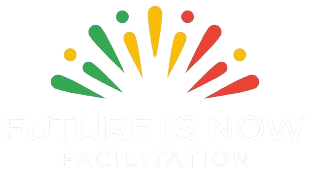
Person-Centered Planning
One or more meetings: Pre-planning allows the facilitator to get to know the participant and their circle of support to plan and facilitate a meaningful, efficient, person-centered meeting. What do they want to discuss? Which topics would they like to avoid? Who do they want to invite to the Person-Centered Meeting? Do they need anything during the meeting to help them participate fully? This service is funded through the Regional Center when first transitioning into the Self-Determination Program.*
2. Person-Centered Meeting
One or more meetings: During the Person-Centered meeting, the team focuses on the participant’s strengths, hopes, and dreams for the future and agrees to support the participant. The team should not discuss the participant’s weaknesses and deficits or others’ preferences. The meeting should be positive, and the team should speak to the participant, not talk about them. This service is funded through the Regional Center when first transitioning into the Self-Determination Program.*
3. Creation of an Actionable Person-Centered Plan
The facilitator writes a Person-Centered Plan with the input and information collected in the pre-planning and person-centered meetings. The facilitator creates a written document that discusses the participant’s wants and needs for their life, where they want to live, how they want to spend their time, who they want to spend time with, and their hopes for the future. The document describes the supports needed to achieve these goals and outlines the action plan to reach those goals. The Person-Centered Plan should incorporate goals from the Individual Program Plan and identify unmet needs and changes in circumstances that might justify additional Regional Center Services. The creation of a Person-Centered Plan is optional but highly recommended. This service is funded through the Regional Center when first transitioning into the Self-Determination Program.*
Pre-Enrollment Transition Support
1. Attend IPP
One or more meetings: The independent facilitator will present the Person-Centered Plan and discuss goals and services needed to support the plan during the Individual Program Plan (IPP) meeting/meetings. The IPP team will review the 12-month cost history (purchase of spending expenditures) and discuss possible new/unmet needs and changes in circumstances that should be addressed in the budget. This service is funded through the Regional Center when first transitioning into the Self-Determination Program.*
2. Negotiate the Individual Budget
The individual budget is the amount of spending the Regional Center authorized for the prior 12 months. If any unmet needs or changes in circumstances were identified during the IPP process, the budget can be adjusted up or down. The Independent Facilitator will help with budget negotiations if the proposed budget does not meet the participant’s needs. This service is funded through the Regional Center when first transitioning into the Self-Determination Program.*
3. Create a Spending Plan
Once the budget is approved, the Independent Facilitator will help develop the spending plan. It identifies the types of services and supports to achieve the goals of the Individual Program Plan. Certain rules and regulations must be followed when developing the spending plan, and the amount of the spending plan cannot exceed the funds in the individual budget. The spending plan must identify the cost of each service, activity, or item that will be purchased, including employee benefits, payroll taxes, insurance, and cost of the Independent Facilitator, if the participant chooses to be supported by one. The spending plan is reviewed by the Regional Center for compliance with state and federal law and then attached to the IPP. This service is funded through the Regional Center when first transitioning into the Self-Determination Program.*


Ongoing Independent Facilitation Services
Once the participant enters the Self-Determination Program, they can choose to use Ongoing Independent Facilitation Services, which can include tracking spending, checking for accuracy, coordinating with the FMS, revisions of the spending plan, identifying and obtaining generic resources, managing staff, negotiating for best prices, coordinating the support team, helping achieve Person-Center Plan goals, and preparing for the next year’s process. This service is paid for by the Financial Management Service (FMS) out of the participant’s budget. The budget can not be increased to cover the cost of an Independent Facilitator. Ongoing Independent Facilitation Services are optional.
*The Independent Facilitator is paid for the above-mentioned services through the Regional Center during the transition phase until the participant enters the Self-Determination Program (for the first time only). Assistance from an Independent Facilitator once the participant is in the Self-Determination Program is paid for by the Financial Management Service (FMS) out of the participant’s budget. The budget can not be increased to cover the cost of an Independent Facilitator.
